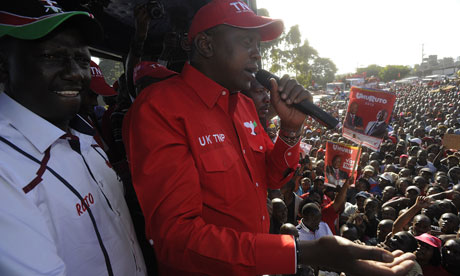By Hannah Stewart
Impunity Watch Reporter, Africa
NAIROBI, Kenya — The High Court of Kenya dismissed arguments on Thursday that Deputy Prime Minister Uhuru Kenyatta’s pending trial in the International Criminal Court for charges of crimes against humanity renders him ineligible for the presidential elections.

Kenyatta and his running mate, William Ruto, are two of four accused at the International Criminal Court of orchestrating tribal fighting that killed 1,200 people after the last vote in 2007. Both men deny the charges.
Kenyatta, a former finance minister and the son of the country’s founding president, is running a close second to Prime Minister Raila Odinga according to opinion polls for the March 4 presidential election.
Odinga and Kenyatta lead largely ethnic-based coalitions with few ideological differences, and there was concern regarding how Kenyatta’s supporters might react had he been barred from the elections.
Similar ethnic rivalries fueled the fighting after the last presidential elections five years ago. The violence marred the image of the east African country, the region’s most powerful economy and a key western ally in the war against militant Islam in the region.
In reaching their decision to decline the case, the panel of five judges said in an oral statement, “the High Court lacks jurisdiction to deal with a question relating to the election of a president.” Moreover, the judges stated that, “this is an issue that is within the exclusive jurisdiction of the Supreme Court.”
The Principal Judge of the High Court, Mbogholi Msagha, further explained that the court lacked jurisdiction over the petitions filed by various legal and rights groups. He stated that the petitioners should have requested the electoral commission exclude Kenyatta and Ruto the ballot.
Msagha also said that the court could not deny Kenyatta and Ruto their right to contest the poll because they had not been convicted. He added that, “they are presumed innocent until proved otherwise.”
It is not immediately clear whether an appeal will be submitted to the highest court. However, it is likely that, if elected president, Kenyatta’s first foreign trip abroad will be to appear in the Hague at a hearing scheduled for April.
Likewise, the Kenyan government is being sued for police brutality in the violence following the 2007 election. The families of seven people shot dead and eight wounded survivors of the post-election violence filed a lawsuit this week to sue the Kenyan government. The petitioners claim that the police fired the shots during a dispute over who won Kenya’s 2007 presidential election.
Four human rights groups are also part of the suit against the government. Moreover, there have been warnings from various international human rights groups that the police are not ready to prevent electoral violence while refraining from human rights violations. Advocacy groups have criticized the Kenyan police for decades of ineffectiveness, corruption, human rights violations, and impunity.
For more information, please see:
ABC – Kenyan Government Sued for Police Brutality – 15 February 2013
BBC News – Uhuru Kenyatta Free to Run After Kenya Election Ruling – 15 February 2013
Reuters – Kenyatta Cleared to Run in Kenya Vote Despite Charges – 15 February 2013
The Guardian – Kenyan Court Clears Way for Uhuru Kenyatta to Run in Election – 15 February 2013